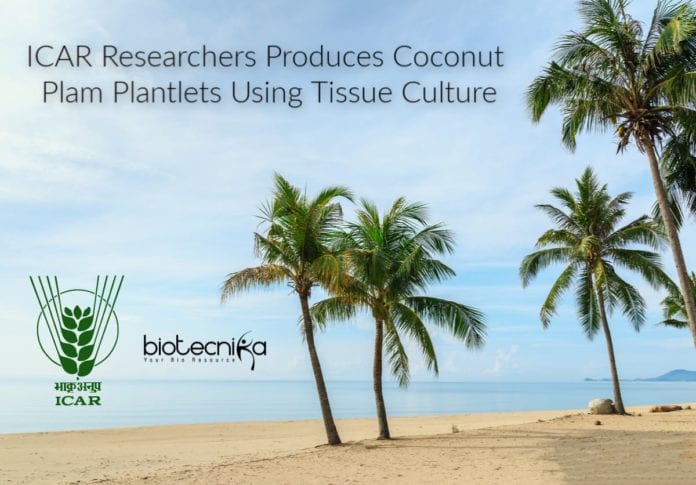ICAR CPCRI’s Coconut Plants
Over the years, several economically important plants have been conserved using tissue culture techniques. In this technique, whole plants are regenerated from parts of plants. However, the method has not been very successful when it comes to palms like coconut palm or toddy palm.
Scientists from the ICAR-Central Plantation Crops Research Institute (CPCRI) at Kayamkulam in Kerala have developed tissue culture plants of the coconut palm.
ICAR CPCRI’s Coconut Plants- Why Is The Coconut Plants Important?
The coconut palm is an essential cultivated palm in the world and is famous for its industrial and commercial applications. In India, Coconut palm is cultivated mainly in the coastal regions of Kerala, Karnataka, Tamil Nadu, Orissa, Andhra Pradesh, Pondicherry, West Bengal, Maharashtra and the islands of Lakshadweep and Andaman and Nicobar.
At present, the coconut palm is propagated through seeds. However, it takes 5 to 10 years for a plant to produce the first harvest. Consequently, crop improvement programs in coconut are time-consuming and time-consuming.
Scientists have to wait for 20 to 30 years to release a new variety with the help of standard breeding approaches. Tissue culture can help overcome this even though many people have developed protocols
using various parts of the plant-like tender leaf, immature inflorescence, shoot tip, and immature embryo. However, they lack reliability and repeatability.ICAR CPCRI’s Coconut Plants- The New Cultivation Technique
CPCRI researchers used tissues from the immature inflorescence. The team of researchers was able to re-generate rooted plants. The plantlets were similar to the mother plant from which the tissue was obtained. Advanced molecular biology techniques have confirmed this.
Regi J Thomas, the leader of the research team, said that the study would have various applications in germplasm conservation and also in the large scale production of cultivars for the farming community. He added that several improvements and refinements were required in the new technology.






























